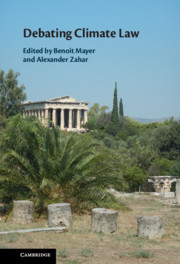Book contents
- Debating Climate Law
- Debating Climate Law
- Copyright page
- Contents
- Contributors
- Acknowledgements
- Abbreviations
- Introduction
- Debate 1: Customary Law
- Debate 2: The ILC’s Role
- Debate 3: CBDR Principle
- Debate 4: Compliance
- ~ A ~ In Defence of the Paris Agreement’s Compliance System: The Case for Facilitative Compliance
- ~ B ~ The Paris Agreement’s Article 15 Mechanism: An Incomplete Compliance Strategy
- Debate 5: Climate Litigation
- Debate 6: Human Rights
- Debate 7: Historical Responsibility
- Debate 8: Climate Migration
- Debate 9: Negative-Emission Technologies
- Debate 10: Solar Radiation Management
- Debate 11: Climate Assessment
- Reflection 1: Adaptation
- Reflection 2: Loss and Damage
- Reflection 3: Disappearing States
- Reflection 4: Climate Finance
- Reflection 5: Non-State Actors
- Reflection 6: Regime Inconsistency
- Reflection 7: Aesthetics
- Conclusion
- Index
~ A ~ - In Defence of the Paris Agreement’s Compliance System: The Case for Facilitative Compliance
from Debate 4: Compliance
Published online by Cambridge University Press: 15 June 2021
- Debating Climate Law
- Debating Climate Law
- Copyright page
- Contents
- Contributors
- Acknowledgements
- Abbreviations
- Introduction
- Debate 1: Customary Law
- Debate 2: The ILC’s Role
- Debate 3: CBDR Principle
- Debate 4: Compliance
- ~ A ~ In Defence of the Paris Agreement’s Compliance System: The Case for Facilitative Compliance
- ~ B ~ The Paris Agreement’s Article 15 Mechanism: An Incomplete Compliance Strategy
- Debate 5: Climate Litigation
- Debate 6: Human Rights
- Debate 7: Historical Responsibility
- Debate 8: Climate Migration
- Debate 9: Negative-Emission Technologies
- Debate 10: Solar Radiation Management
- Debate 11: Climate Assessment
- Reflection 1: Adaptation
- Reflection 2: Loss and Damage
- Reflection 3: Disappearing States
- Reflection 4: Climate Finance
- Reflection 5: Non-State Actors
- Reflection 6: Regime Inconsistency
- Reflection 7: Aesthetics
- Conclusion
- Index
Summary
This chapter debates the appropriateness of the Paris Agreement’s ‘compliance’ system. The treaty’s Article 15 establishes ‘a mechanism to facilitate implementation of and promote compliance with the provisions of this Agreement’. Views differ radically on the legal mandate of this mechanism and its capacity to ensure that states comply with their treaty obligations. Meinhard Doelle praises the mechanism’s ability to sensitively inform domestic political and legal processes and, thus, to increase the likelihood of an effective implementation of states’ obligations. Anna Huggins develops the argument that an effective compliance system comprises both facilitation and enforcement elements, yet the Paris mechanism limits itself to facilitation. Moreover, in its facilitative role, the mechanism is duplicative of other facilitative elements of the Agreement.
Keywords
- Type
- Chapter
- Information
- Debating Climate Law , pp. 86 - 98Publisher: Cambridge University PressPrint publication year: 2021
- 2
- Cited by

